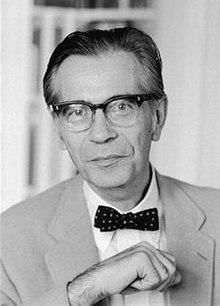Our website is made possible by displaying online advertisements to our visitors.
Please consider supporting us by disabling your ad blocker.
Richard Hofstadter
Richard Hofstadter | |
|---|---|
 Hofstadter circa 1970 | |
| Born | August 6, 1916 Buffalo, New York, U.S. |
| Died | October 24, 1970 (aged 54) New York City, New York, U.S. |
| Spouses |
|
| Awards | Pulitzer Prize (1956, 1964) |
| Academic background | |
| Education | |
| Doctoral advisor | Merle Curti |
| Influences | |
| Academic work | |
| Discipline | History |
| Sub-discipline | American history |
| Institutions | Columbia University |
| Doctoral students | |
| Notable students | |
| Main interests | History of American political culture |
| Notable works | |
| Influenced | |
Richard Hofstadter (August 6, 1916 – October 24, 1970) was an American historian and public intellectual of the mid-20th century. Hofstadter was the DeWitt Clinton Professor of American History at Columbia University. Rejecting his earlier historical materialist approach to history, in the 1950s he came closer to the concept of "consensus history", and was epitomized by some of his admirers as the "iconic historian of postwar liberal consensus."[5] Others see in his work an early critique of the one-dimensional society, as Hofstadter was equally critical of socialist and capitalist models of society, and bemoaned the "consensus" within the society as "bounded by the horizons of property and entrepreneurship",[5] criticizing the "hegemonic liberal capitalist culture running throughout the course of American history".[6]
His most widely read works are Social Darwinism in American Thought, 1860–1915 (1944); The American Political Tradition (1948); The Age of Reform (1955); Anti-intellectualism in American Life (1963); and the essays collected in The Paranoid Style in American Politics (1964). He was twice awarded the Pulitzer Prize: in 1956 for The Age of Reform, an analysis of the populism movement in the 1890s and the progressive movement of the early 20th century; and in 1964 for the cultural history Anti-intellectualism in American Life.[7] He was an elected member of the American Academy of Arts and Sciences[8] and the American Philosophical Society.[9]
- ^ "Lawrence W. Levine (1933-2006) | Perspectives on History | AHA".
- ^ "Richard D. Heffner '46, '47 GSAS, Host of Public Television's Open Mind | Columbia College Today".
- ^ Katznelson, Ira (May 11, 2021). "Measuring Liberalism, Confronting Evil: A Retrospective". Annual Review of Political Science. 24 (1): 1–19. doi:10.1146/annurev-polisci-042219-030219. ISSN 1094-2939.
- ^ Italie, Hillel (April 6, 2013). "Robert Remini Dies, Leaves Legacy as Andrew Jackson Scholar". The Christian Science Monitor. Boston, Massachusetts: Christian Science Publishing Society. Associated Press. Retrieved November 19, 2019.
- ^ a b Geary (2007), p. 429
- ^ Geary, Dan (April 14, 2009). Radical Ambition: C. Wright Mills, the Left, and American Social Thought. University of California Press. pp. 126. ISBN 9780520943445.
C. Wright Mills, the Left, and American Social Thought, which sharply criticized.
- ^ Benét (1996), Reader's Encyclopedia (4th ed.), p. 478.
- ^ "Richard Hofstadter". American Academy of Arts & Sciences. Retrieved December 21, 2022.
- ^ "APS Member History". search.amphilsoc.org. Retrieved December 21, 2022.
Previous Page Next Page


